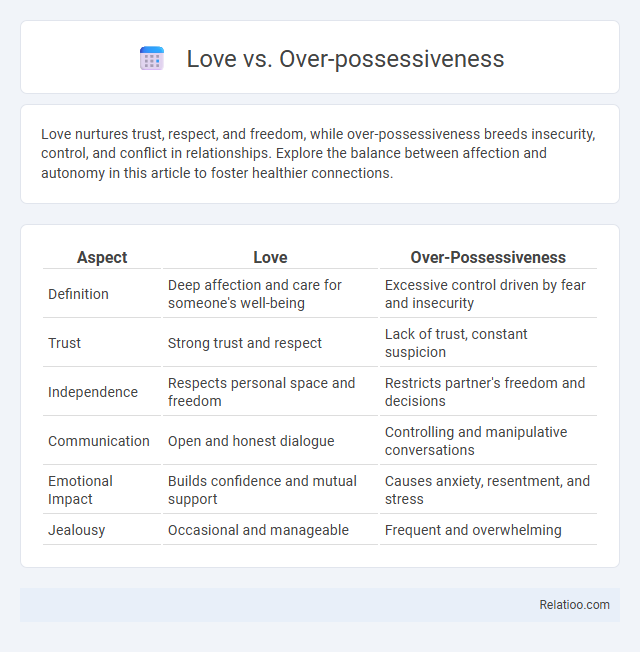Love nurtures trust, respect, and freedom, while over-possessiveness breeds insecurity, control, and conflict in relationships. Explore the balance between affection and autonomy in this article to foster healthier connections.
Table of Comparison
| Aspect | Love | Over-Possessiveness |
|---|---|---|
| Definition | Deep affection and care for someone's well-being | Excessive control driven by fear and insecurity |
| Trust | Strong trust and respect | Lack of trust, constant suspicion |
| Independence | Respects personal space and freedom | Restricts partner's freedom and decisions |
| Communication | Open and honest dialogue | Controlling and manipulative conversations |
| Emotional Impact | Builds confidence and mutual support | Causes anxiety, resentment, and stress |
| Jealousy | Occasional and manageable | Frequent and overwhelming |
Understanding the Essence of Love
Love is characterized by trust, respect, and freedom, allowing individuals to grow and thrive without feeling confined or controlled. Over-possessiveness stems from insecurity and fear of loss, leading to behaviors that suffocate and restrict a partner's independence. Understanding the essence of love involves recognizing that true affection nurtures autonomy and emotional security rather than dominance or control.
Defining Over-Possessiveness in Relationships
Over-possessiveness in relationships is characterized by excessive control and jealousy, often stemming from fear of abandonment and insecurity. This behavior undermines trust and autonomy, creating a toxic environment that contrasts sharply with healthy love, which fosters mutual respect and freedom. Identifying over-possessiveness early is crucial to maintaining balanced, supportive partnerships.
Key Differences Between Love and Over-Possessiveness
Love nurtures trust, respect, and freedom, fostering a healthy emotional connection, while over-possessiveness stems from insecurity and control, leading to jealousy and restriction. You can recognize love through mutual understanding and support, whereas over-possessiveness often results in constant monitoring and emotional suffocation. Identifying these key differences helps maintain balanced, fulfilling relationships without crossing into harmful territory.
Healthy Boundaries: The Foundation of True Love
Healthy boundaries form the foundation of true love by fostering mutual respect and trust, preventing the harmful effects of over-possessiveness. You can maintain your individuality and emotional well-being while nurturing intimacy, ensuring that love grows without control or jealousy. Establishing clear limits helps relationships thrive through open communication and balanced affection.
Signs of Over-Possessiveness to Watch For
Signs of over-possessiveness include constant checking on your partner's whereabouts, excessive jealousy over harmless interactions, and controlling behavior that limits personal freedom. You may notice demands for frequent updates, distrust without reason, and attempts to isolate your partner from friends or activities. Recognizing these behaviors early helps distinguish genuine love from unhealthy control.
The Psychological Roots of Possessive Behavior
Possessive behavior often stems from deep-seated psychological insecurities and attachment issues, where fear of abandonment triggers controlling tendencies. Unlike healthy love characterized by trust and respect, over-possessiveness reflects anxiety and low self-esteem, manifesting as jealousy and constant monitoring of a partner's actions. Understanding these roots is crucial for fostering secure relationships and addressing the emotional wounds that fuel possessive patterns.
Impact of Over-Possessiveness on Relationship Well-being
Over-possessiveness in relationships often leads to decreased trust, increased anxiety, and emotional distress, undermining overall relationship well-being. Love fosters mutual respect and freedom, whereas over-possessiveness manifests as controlling behavior that stifles individuality and communication. Persistent over-possessiveness correlates strongly with higher conflict rates and relationship dissatisfaction, ultimately jeopardizing partnership stability.
Nurturing Trust Over Control
Nurturing trust in relationships emphasizes mutual respect and open communication, contrasting sharply with over-possessiveness, which often stems from insecurity and a need for control. Love fosters emotional safety and freedom, allowing partners to grow individually while maintaining a strong bond. Prioritizing trust over control creates a healthier, more balanced connection that sustains long-term intimacy and commitment.
Strategies to Overcome Possessiveness
Over-possessiveness can undermine genuine love by stifling trust and personal freedom, making it crucial to adopt strategies that promote healthy boundaries. Fostering open communication, practicing self-awareness, and building individual self-esteem help you differentiate between love and controlling behavior. Seeking professional counseling and engaging in trust-building activities can empower your relationship to thrive without the destructive impact of possessiveness.
Building Lasting Love Through Mutual Respect
Love thrives on mutual respect, fostering trust and emotional security between partners. Over-possessiveness undermines this foundation by creating control and insecurity, leading to conflicts and emotional distance. Building lasting love requires balancing affection with respect for individuality, ensuring both partners feel valued and free.

Infographic: Love vs Over-possessiveness
 relatioo.com
relatioo.com